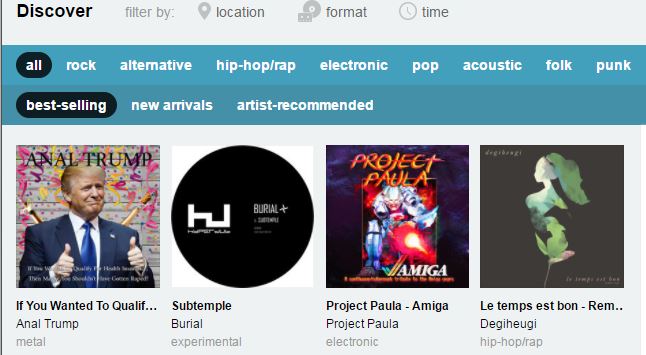
Metal is fun and this is one of its greatest strengths. But great strengths are also great weaknesses, and the fun in metal leads to people to assume the usual forces do not act within it. One such force is economics, both in the sale of music and the sale of attention.
We can visualize the metal world as a giant economy based on who is listening to and talking about which release. Money is replaced by stereo-hours (or earbud-hours) with those being of unequal value. For example, a record company exec or top-ranked writer listening to an album may have more import than the average fan because such a role in the metal economy means that the exec or writer lures more people to specific releases. Both writers and execs make their money by betting on a type of stock market where the releases they choose as important either rise or fall, with corresponding consequences for the career in question.
With this in mind, we can look at the flow of new releases as a type of market. The more releases there are, the less each one is valuable; the more accurate information there is about new music, the more likely consumer choice is to be informed choice and reflect some measure of quality. When there are too many releases, all are disproportionately worth more, with the big mainstream bands — analogous to blue chip stocks — seeming like better options to the consumer than taking a chance in a sea of bands that seem to be about equal in potential. When all record reviews praise every new album, consumers have no information, and turn toward buying from established bands, even if the quality is sub-par.
Similarly, the effect of digital downloading can be modeled. Leaving aside purchases of digital music for a moment, we can look at the effects of downloading the latest releases from mega.nz or torrents. When the cost is free, the consumer may value that album less, but more importantly, the consumer is suddenly swimming in utter tons of music. If you have 500gb of death metal on your hard drive, it is unlikely that you will have the time or energy to listen to even a tenth of that. The more music that is downloaded, the less any particular release is likely to get stereo-hours.
Looking even further, we can see the impact of the metal community. When the metal community is supportive of every release that comes out, it means that none stand out and as a result, all get fewer listens. Where a healthy economy has some clear winners, a blind endorsement for all releases means that consumers know nothing about differences between them in quality — leaving aside aesthetic/genre for the moment — and so end up purchasing blindly or not at all. When digital downloads are available for free, or streaming online is free, the consumer sees less of a reason to visit a band for more than a few listens.
And extending this a bit further, the more similar bands are to one another, both aesthetically and in quality, the less likely consumers are to choose any one. This type of “heat death” of the metal markets occurs when consumers lack information about bands or cannot find substantial differences between them. At that point, the smart strategy for a metal listener is to download something new on a regular basis and listen to it for a few weeks because, heck, it is about like every other release in quality and sound. They know it will last for only a few weeks, so there is no point in buying it. I suggest that it is this phenomenon — a glut of similar-sounding and similar-quality metal bands — and not digital piracy itself that is terrorizing the music industry.
Industries tend to respond to a narrowing of the market by increasing frequency of product release. This in turn creates a glut, and tends to drive quality down, because in order to release regularly they need people who will bash out something obvious instead of spend time ruminating on it. Further, industry does not want expensive single units, as occur when musicians try to make a career of it, but — much like information technology hiring — prefer the young and clueless who they can use to make a release or two for low cost. All of these contribute to an oversupply of releases, a situation which is made worse by the tendency of journalists to champion almost all of these releases, which makes consumers less likely to purchase any single one.
Let us then consider the role of the Elitist. If we use the non-hipster definition of elitist, the term comes to mean those who prefer quality over quantity. That means that instead of 500gb of similar-sounding and similar-quality bands, this person wants 50gb of high-quality bands that may or may not be similar-sounding. Elitists create a different type of pressure on the metal market, which is concentration: they create winners who rise above the herd, because the non-hipster elitist also tends to be a type of “power user” of metal who spreads information to friends and influential people. When an elitist likes something, unlike when an average person does, the consumer is offered a strong signal of quality or interest. This creates a tendency to rely on elitists more, much like experienced music consumers read the cynical reviewers because they do not have the time or energy to sort through many indistinguishable releases.
Elitists may be the answer to the music industry’s woes. With labels releasing as fast as they can, and journalists praising almost everything, the result is a “heat death” of the market. When elitists step in and separate the good from the merely adequate, this creates contours to the market and allows some bands to win, which creates a pressure on bands to not simply produce, but produce well, encouraging an expenditure of more time, thought and effort on the releases in question. These elitists are distinct from hipster elitists, who do not value quality over quantity but value novelty over both, and specialize in bands that — whether good or bad, as the hipster elitist is agnostic to quality — are weird, quirky, odd or ironic. This creates a market pressure that rewards the trivial and manufactures niches which can then be further developed by non-hipster elitists who sort the best above the rest.
Similarly, since online downloading does not appear to be going away, the non-hipster elitist serves a role in making downloading work for the music industry: by selecting some bands as good, they signal that these are worth buying while the others are merely worth downloading. We have no data on how many people who download actually listen to the music they capture, but one thought is that like many collectors of free things, they simply hoard it — especially since they lack the time to actually listen to all of it. The average person may be able to hear twelve hours of music a day, but they can probably only listen to five or six before they lose track of the differences. Listening requires concentration and not very many people have even four hours a day to actually pay attention to music.
As an explorer of metal music, I have downloaded at least 500gb in my lifetime. 99% of it goes right back to where it came: ashes to ashes, bits to zeroes. The remaining one percent gets purchased and, from informal conversations with other metalheads, I am far from alone in this. For this reason, I have for years encouraged “natural selection” downloading, because it means that instead of buying blind, consumers devote their attention to music that they like. Streaming sites like Spotify, Bandcamp, Soundcloud and ReverbNation have arisen to address this need, and informally many users report scanning those tracks before deciding to make an illegal download. Whether or not the user eventually purchases the music, it is succeeding in the market for attention, and this leads to its propagation among metalheads and greater likelihood of being purchased.
Few will say so publicly, but in private many journalists, fans and workers in the industry will admit that metal has lost quality massively since 1994. Not coincidentally, its popularity has been steadily rising since that time, as has its availability. While many blame the internet and digital downloads for collapse of metal, the model above suggests that it is not the means of consumption, but the glut of the market that is causing the woes of the music industry and fans alike. While unpopular, non-hipster elitists may represent a solution to this problem.
6 CommentsTags: attention economics, economics of metal, Heavy Metal, metal economics




